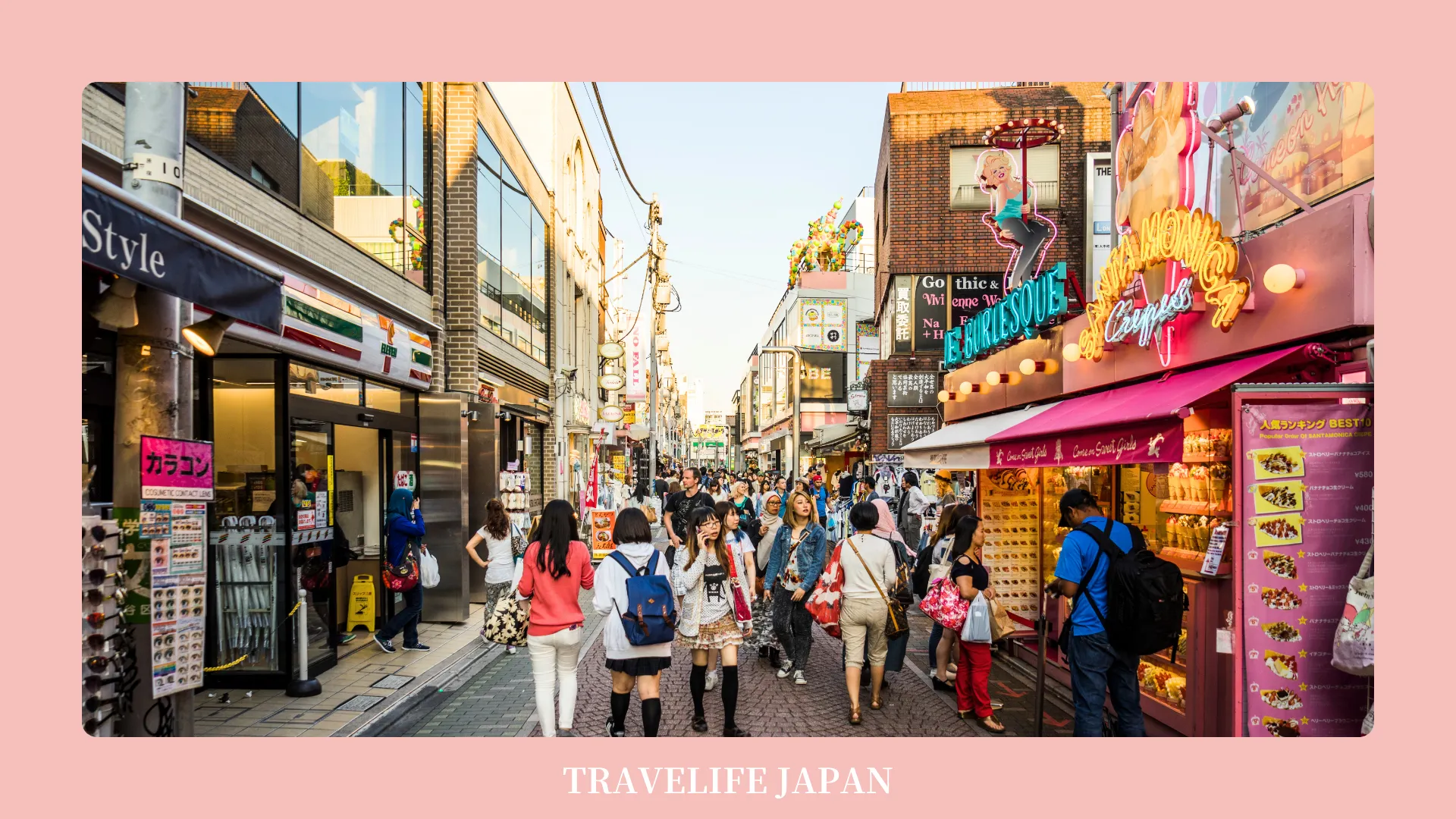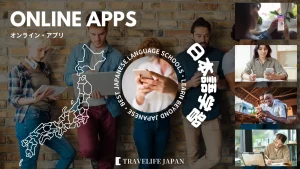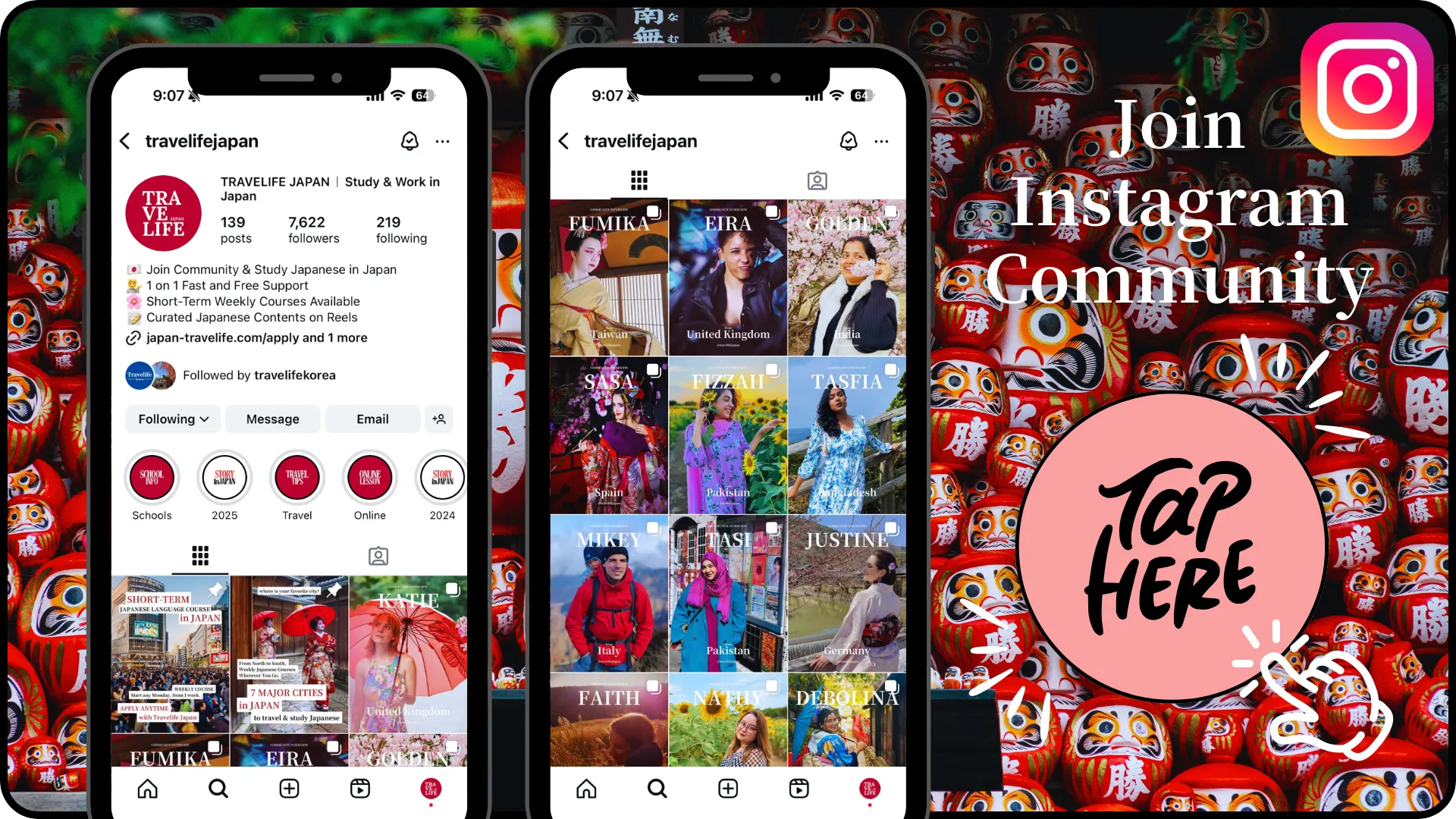Planning a trip to Japan? Enhance your adventure with our essential guide to useful Japanese phrases for travelers. This selection will help you navigate dining, shopping, and emergencies, ensuring a seamless journey. Dive into the heart of Japanese culture and make every moment of your visit truly unforgettable. Our guide promises a deeper connection with the local way of life, turning your travel into an immersive cultural experience.
Want to learn Japanese in Japan? Ask any questions!
Apply with Travelife Japan to receive personalized guidance, application support, and a smoother enrollment experience.
Useful Japanese Phrases for Travelers

Greeting in Japan
- こんにちは Konnichiwa
Hello (Daytime greeting). - こんばんは Konbanwa
Good evening. - おはようございます Ohayou gozaimasu
Good morning. - さようなら Sayounara
Goodbye (formal). - ありがとうございます Arigatou gozaimasu
Thank you (formal). - どうもありがとう Doumo arigatou
Thank you very much. - すみません Sumimasen
Excuse me / I’m sorry. - お願いします Onegaishimasu
Please (request). - はい Hai
Yes. - いいえ Iie
No.
Dining in Japan
- メニューを見せてください Menyuu o misete kudasai
Please show me the menu. - これは何ですか? Kore wa nan desu ka?
What is this? - 美味しい Oishii
Delicious. - いただきます Itadakimasu
Let’s eat / Thank you for the meal (before eating). - ごちそうさまでした Gochisousama deshita
Thank you for the meal (after eating). - ビールを一つください Biiru o hitotsu kudasai
One beer, please. - 水をください Mizu o kudasai
Water, please. - アレルギーがあります Arerugii ga arimasu
I have an allergy. - 辛くないものはありますか? Karaku nai mono wa arimasu ka?
Do you have anything that’s not spicy? - 砂糖なしで Satounashi de
Without sugar.
Shopping in Japan
- これはいくらですか? Kore wa ikura desu ka?
How much is this? - 割引はありますか? Waribiki wa arimasu ka?
Is there a discount? - 試着できますか? Shichaku dekimasu ka?
Can I try this on? - これを買います Kore o kaimasu
I’ll buy this. - カードで払えますか? Kaado de haraemasu ka?
Can I pay with a card? - レシートをください Reshiito o kudasai
Please give me a receipt. - 袋はいりません Fukuro wa irimasen
I don’t need a bag. - 交換できますか? Koukan dekimasu ka?
Can I exchange this? - 返品できますか? Henpin dekimasu ka?
Can I return this? - もっと安いものはありますか? Motto yasui mono wa arimasu ka?
Do you have something cheaper?
Direction and Transportation in Japan
- 駅はどこですか? Eki wa doko desu ka?
Where is the station? - バス停はどこですか? Basutei wa doko desu ka?
Where is the bus stop? - タクシーを呼んでください Takushii o yonde kudasai
Please call a taxi. - 地図を見せてください Chizu o misete kudasai
Please show me the map. - 右に曲がってください Migi ni magatte kudasai
Please turn right. - 左に曲がってください Hidari ni magatte kudasai
Please turn left. - 直進してください Chokushin shite kudasai
Please go straight. - チケットはどこで買えますか? Chiketto wa doko de kaemasu ka?
Where can I buy a ticket? - 次の停留所は何ですか? Tsugi no teiryuusho wa nan desu ka?
What is the next stop? - 空港に行きたいです Kuukou ni ikitai desu
I want to go to the airport.
Emergency in Japan
- 助けてください Tasukete kudasai
Please help me. - 病院はどこですか? Byouin wa doko desu ka?
Where is the hospital? - 警察を呼んでください Keisatsu o yonde kudasai
Please call the police. - 火事です! Kaji desu!
Fire! - 私は迷子です Watashi wa maigo desu
I am lost. - パスポートを失くしました Pasupooto o nakushimashita
I have lost my passport. - 携帯がないです Keitai ga nai desu
I don’t have my phone. - 危険ですか? Kiken desu ka?
Is it dangerous? - 緊急です Kinkyuu desu
It’s an emergency. - 日本語を話せません Nihongo o hanasemasen
I don’t speak Japanese.
Learning Japanese Language Before Travel

Before your trip to Japan, take advantage of online apps, classes, and YouTube tutorials to learn some Japanese. These resources, many of which are free, make learning accessible and varied, covering everything from basic greetings to cultural nuances. This effort will not only smooth out your travels but also deepen your connection with Japan’s culture. Being able to chat with locals is a priceless part of the travel experience, turning simple interactions into memorable encounters and giving you a deeper appreciation of the places you visit.


Useful Tips for Travel in Japan

Securing Accommodations
Avoid the uncertainty of last-minute bookings by reserving your stay well ahead, especially during peak seasons like the New Year, cherry blossom period, Golden Week, and August. Japanese inns, or ryokans, often have strict check-in times; missing these can mean arriving to unprepared accommodations. Planning your arrival time is crucial to ensure a smooth and enjoyable stay in Japan’s sought-after lodgings.
Packing Light
Travel light to navigate Japan’s compact hotel rooms and public transport with ease. While there’s no strict dress code for temples and shrines, upscale venues may require more formal attire, avoiding sleeveless shirts and sandals for men. Also, anticipate sitting on floors in some dining settings, which could be uncomfortable in restrictive clothing. Packing smartly ensures comfort and convenience, making your Japanese adventure smoother and more enjoyable.
Preparing SIM Card
Upon arrival, opt for a data-heavy SIM card at the airport to ensure smooth navigation through Japan’s complex address system. The reliance on digital maps and apps is nearly indispensable for efficiently exploring the country. This simple step enhances your travel experience, keeping you connected and oriented during your adventures in Japan.
Knowing Weather
Japan’s seasons bring diverse weather conditions, from hot, humid summers with heatstroke risks to the rainy season starting in late June. Equip yourself with a UV-blocking umbrella and stay hydrated. Typhoon season from September to October demands close monitoring of weather alerts for possible disruptions. Winters, especially in the north, can be cold with significant snowfall. Convenient stores across Japan offer weather-related items like umbrellas and cooling wipes, ensuring you’re prepared for any conditions.
Bringing Cash
In Japan, carrying cash is essential, especially in rural areas and older establishments where credit cards may not be widely accepted. Always have enough yen for transactions in ryokans, small eateries, and shops. When paying, use the tray provided at the counter. Tipping is not customary in Japan; instead, some places add a service charge to the bill. This approach simplifies transactions and respects local customs, making for a smoother travel experience.
Be Patient with Queueing
In Japan, the practice of forming orderly queues for everything from public transport to checkout counters is deeply ingrained in the culture. Observing this etiquette is crucial for a harmonious experience. Once on a train platform, it’s common to see well-organized lines, but finding a seat becomes a swift, individual effort once aboard. Embracing this structured approach to queuing is part of the local lifestyle, enhancing the efficiency and respect that characterize Japanese society.
Conclusion
As you prepare for your journey, remember to review useful Japanese phrases that can enhance your travel experience. Learning some Japanese beforehand not only makes your trip more enjoyable but also allows you to connect more deeply with the culture and people. Whether it’s for navigating, dining, or shopping, a little language preparation goes a long way. Enjoy every moment of your adventure in Japan, embracing both its modern wonders and rich traditions.
CONTACT US
For studying Japanese in Japan, please contact us.


